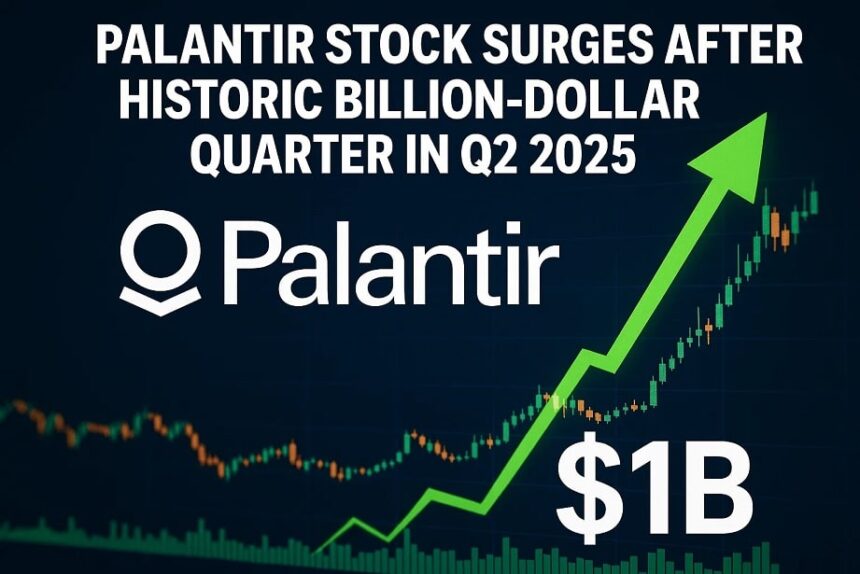Palantir Technologies, Inc. (NASDAQ: PLTR) has solidified its status as a powerhouse in the artificial intelligence (AI) and data analytics sector, reporting its first-ever billion-dollar revenue quarter in Q2 2025. The company announced $1.004 billion in revenue, surpassing Wall Street’s expectations of $939 million and marking a 48% year-over-year increase. This milestone, announced on August 4, 2025, triggered a surge in Palantir’s stock, with shares climbing over 4.6% to a record high of $168 in after-hours trading. The rally was further fueled by a recently secured $10 billion U.S. Army contract, one of the largest Department of Defense (DoD) software deals in history. With a market capitalization now exceeding $379 billion, Palantir has cemented its place among the top 20 most valuable U.S. companies, outpacing corporate giants like IBM, Cisco, and Coca-Cola.
Background on Palantir Technologies
Founded in 2003 by Peter Thiel, Alex Karp, and others, Palantir Technologies is a Denver-based software company specializing in AI-driven data analytics. Its flagship platforms—Gotham, Foundry, and the Artificial Intelligence Platform (AIP)—enable governments and businesses to process vast datasets, uncover actionable insights, and make data-driven decisions. Palantir’s Gotham platform supports national security and defense operations, while Foundry and AIP cater to commercial enterprises, offering tools for supply chain optimization, fraud detection, and operational efficiency.
Palantir’s business model thrives on long-term, high-value contracts, particularly with government agencies like the U.S. Department of Defense, NATO, and intelligence communities. In recent years, the company has aggressively expanded its commercial footprint, with U.S. commercial revenue becoming a significant growth driver. Palantir’s inclusion in the S&P 500 in September 2024 and its shift to the Nasdaq-100 in December 2024 have further boosted its visibility among institutional and retail investors.
Q2 2025 Financial Highlights
Palantir’s Q2 2025 performance was a testament to its growing influence in the AI and defense tech sectors. Key financial metrics include:
- Revenue: $1.004 billion, up 48% year-over-year, beating analyst estimates of $939.25 million.
- Earnings Per Share (EPS): Adjusted EPS of $0.16, surpassing forecasts of $0.14 and up 77% from Q2 2024.
- U.S. Commercial Revenue: $306 million, a 93% year-over-year increase, driven by demand for Palantir’s AIP.
- U.S. Government Revenue: $426 million, up 53% year-over-year, bolstered by defense contracts.
- Total Contract Value (TCV): $2.27 billion, a 140% increase from Q2 2024, including $843 million in commercial deals (up 222%).
- Net Income: $326.7 million, or $0.13 per share, a 144% increase from $134.1 million in Q2 2024.
- Cash Position: Over $6 billion in cash and investment securities, with zero debt.
The company also raised its full-year 2025 revenue guidance to $4.14-$4.15 billion, above Wall Street’s estimate of $3.91 billion, and projected Q3 2025 revenue of $1.083-$1.087 billion, reflecting a 50% year-over-year growth rate—the highest sequential quarterly growth guidance in its history. Palantir expects adjusted operating income of $1.912-$1.92 billion and adjusted free cash flow of $1.8-$2 billion for the year, signaling robust profitability.
Financial Metric | Q2 2025 | Q2 2024 | Year-over-Year Growth |
|---|---|---|---|
Revenue | $1.004 billion | $678 million | 48% |
Adjusted EPS | $0.16 | $0.09 | 77% |
U.S. Commercial Revenue | $306 million | $158 million | 93% |
U.S. Government Revenue | $426 million | $278 million | 53% |
Total Contract Value | $2.27 billion | $0.945 billion | 140% |
Net Income | $326.7 million | $134.1 million | 144% |
Drivers of the Billion-Dollar Quarter
Several factors contributed to Palantir’s historic Q2 performance:
- Surging AI Demand: Palantir’s AIP has seen unprecedented adoption, particularly in the commercial sector. The platform’s ability to integrate large language models (LLMs) and transform structured and unstructured data into actionable insights has driven demand across industries like healthcare, manufacturing, and finance. The company conducted over 660 AI bootcamps in Q1 2025, allowing prospective clients to test its technology, resulting in a 43% year-over-year increase in customer count to 769.
- Major Government Contracts: Palantir secured a $10 billion, 10-year contract with the U.S. Army, consolidating 75 existing contracts into a single agreement to enhance military readiness and efficiency. Additionally, the U.S. Space Force awarded a $218 million delivery order, and the Maven Smart System’s spending ceiling was raised to $795 million. These deals underscore Palantir’s critical role in national security and defense tech.
- Commercial Expansion: U.S. commercial revenue surged 93% to $306 million, driven by partnerships with major corporations like Amazon. Palantir’s bootcamp strategy, pairing customers with developers to create tailored AI solutions in as little as five days, has accelerated commercial bookings, which reached $810 million in Q1 2025, up 183%.
- Strategic Partnerships: Palantir’s integration of xAI’s Grok chatbot into its AI platform has enhanced its offerings, attracting retail investor interest and positioning the company to capitalize on the generative AI trend.
CEO Alex Karp emphasized the company’s momentum, stating, “The growth rate of our business has accelerated radically… The skeptics are admittedly fewer now, having been defanged and bent into a kind of submission.”
Market Reaction and Valuation Concerns
Palantir’s stock surged 4.6% to $168 in after-hours trading on August 4, 2025, reflecting investor optimism about its AI-driven growth and government contracts. Year-to-date, the stock has risen over 110%, outpacing the S&P 500’s 7.4% gain and making Palantir the top-performing AI stock in the index. The company’s market cap, now near $379 billion, has propelled it past legacy firms like Salesforce and IBM, ranking it among the top 10 U.S. tech companies.
However, Palantir’s valuation raises concerns among some analysts. The stock trades at a forward price-to-earnings (P/E) ratio of 276, significantly higher than the S&P 500’s average of 22.4, and a price-to-sales (P/S) ratio of 123, compared to Nvidia’s 35. Critics, like RBC Capital Markets’ Rishi Jaluria, argue that the valuation is “unsustainable” absent consistent beat-and-raise quarters. Others, like Wedbush’s Dan Ives, remain bullish, citing Palantir’s $10 billion Army deal as “one of the largest ever DoD software contracts” and a tailwind for future growth.
Retail investors have played a significant role in Palantir’s surge, with $339.72 million in net purchases from February 5-11, 2025, trailing only Nvidia and Tesla. Social media platforms like Reddit, StockTwits, and X have dubbed Palantir an “AI all-star,” with posts highlighting its government contracts and commercial momentum.
Industry Context
The AI market is projected to grow from $200 billion in 2025 to over $2 trillion by 2030, driven by demand for data analytics, autonomous systems, and agentic AI solutions. Palantir’s platforms, which enable real-time decision-making for mission-critical applications, position it at the forefront of this transformation. The company’s government contracts, including a 45% spike in U.S. surveillance deals in Q1 2025, align with increasing geopolitical tensions and defense modernization efforts.
Palantir faces competition from companies like C3.ai, CrowdStrike, and Snowflake, but its unique focus on integrating AI with proprietary datasets and its entrenched government relationships provide a competitive moat. The company’s work with Israel’s Ministry of Defense and NATO’s adoption of the Maven Smart System further enhance its global influence.
Risks and Challenges
Despite its success, Palantir faces several risks:
- High Valuation: Trading at 276 times forward earnings and 123 times sales, Palantir’s valuation is among the highest in the S&P 500, raising concerns about a potential correction if growth slows or market sentiment shifts.
- Reliance on Government Contracts: Government deals account for 55% of revenue, exposing Palantir to policy changes or budget cuts.
- International Commercial Weakness: International commercial revenue declined slightly to $147.1 million in Q2 2025, down from $148 million in Q2 2024, due to challenges in Europe and the Middle East.
- Ethical Controversies: Palantir’s surveillance and military applications, including its work with Israel’s Ministry of Defense, have drawn criticism from human rights advocates, potentially impacting its brand.
Outlook and Future Catalysts
Palantir’s raised guidance and record $2.27 billion in Q2 contract value signal strong momentum. The company’s focus on efficiency—planning to grow revenue 10x while reducing headcount to 3,600 from 4,100—underscores its commitment to profitability. CEO Alex Karp’s vision of Palantir as a “strategic backbone for real-time, mission-critical systems” aligns with its growing role in defense and enterprise markets.
Analysts project a potential $1 trillion valuation by 2027, driven by a 30-35% compound annual growth rate (CAGR). Bullish price targets range from $170-$375 for 2026, with some forecasting $893 per share by 2030. However, bears warn of a possible AI bubble correction in late 2025 or 2026 if growth falters.
Key catalysts include:
- AI Platform Expansion: Integration of xAI’s Grok and continued AIP adoption could drive commercial growth.
- Defense Contracts: The $10 billion Army deal and potential NATO expansions provide long-term revenue visibility.
- S&P 500 and Nasdaq-100 Inclusion: Increased institutional ownership through ETFs tracking these indexes could support further stock gains.
Palantir’s first billion-dollar quarter marks a turning point, showcasing its ability to deliver on the promise of AI-driven data analytics at scale. With robust growth in both government and commercial sectors, a debt-free balance sheet, and a strategic focus on AI innovation, Palantir is well-positioned to capitalize on the $2 trillion AI market opportunity. However, its sky-high valuation and reliance on government contracts warrant caution for risk-averse investors.
For growth-oriented investors, Palantir remains a compelling bet on the AI revolution, with its Q2 results and $10 billion Army contract reinforcing its role as a leader in defense and enterprise tech. As the company continues to “eviscerate” expectations, in the words of CEO Alex Karp, Palantir’s trajectory suggests it could redefine the future of AI-powered solutions.














